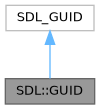An GUID is a 128-bit identifier for an input device that identifies that device across runs of SDL programs on the same platform. More...


Public Member Functions | |
| constexpr | GUID (const GUIDRaw &gUID={}) noexcept |
| Wraps GUID. More... | |
| GUID (StringParam pchGUID) | |
| Convert a GUID string into a GUID structure. More... | |
| std::string | ToString () const |
| Get an ASCII string representation for a given GUID. More... | |
Detailed Description
If the device is detached and then re-attached to a different port, or if the base system is rebooted, the device should still report the same GUID.
GUIDs are as precise as possible but are not guaranteed to distinguish physically distinct but equivalent devices. For example, two game controllers from the same vendor with the same product ID and revision may have the same GUID.
GUIDs may be platform-dependent (i.e., the same device may report different GUIDs on different operating systems).
- Since
- This struct is available since SDL 3.2.0.
Constructor & Destructor Documentation
◆ GUID() [1/2]
|
inlineconstexprnoexcept |
- Parameters
-
gUID the value to be wrapped
◆ GUID() [2/2]
|
inline |
Performs no error checking. If this function is given a string containing an invalid GUID, the function will silently succeed, but the GUID generated will not be useful.
- Parameters
-
pchGUID string containing an ASCII representation of a GUID.
- Postcondition
- a GUID structure.
- Thread safety:
- It is safe to call this function from any thread.
- Since
- This function is available since SDL 3.2.0.
- See also
- GUID.ToString
The documentation for this struct was generated from the following file:
- SDL3pp/SDL3pp_guid.h